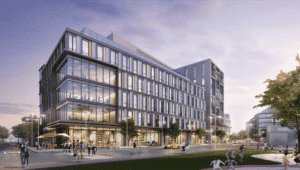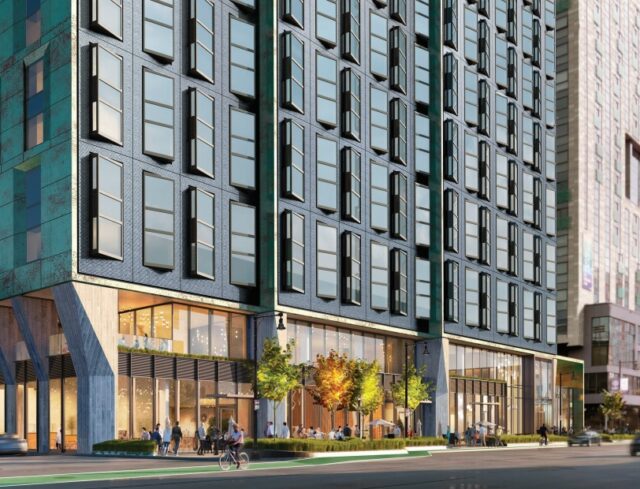
Developers kicked off plans for life science expansion along Allston’s Western Avenue corridor, including King Street Properties and Mugar Enterprises’ Nexus project including 515,000 square feet of office-lab space. Image courtesy of DiMella Shaffer
New Frontiers for the Life Science Industry
The booming life science industry sprouted new tendrils beyond East Cambridge, aided by robust funding activity.
Massachusetts biotech companies secured $4.8 billion in venture capital investment in 2018 and another $1.5 billion during the first half of 2019, according to MassBio, generating demand for real estate outside Kendall Square.
Harvard University’s Allston Land Co. real estate subsidiary named Tishman Speyer as private development partner for its Enterprise Research Campus on Western Avenue in Allston. Plans call for 400,000 square feet of office-lab space, a 250,000-square-foot hotel and conference center and 250,000 square feet of residential space on 14 acres.
The property is steps from the proposed Nexus at the Allston Innovation Corridor, where life science specialist King Street Properties and Mugar Enterprises seek to build two office-lab buildings totaling 515,000 square feet and a 40-unit residential building.
West Cambridge benefited from Kendall Square’s pricey rents and low vacancies as The Davis Cos.’ Alewife Research Center speculative development attracted five new life science companies to Cambridgepark Drive. A California life science REIT, Healthpeak, acquired the ARC in December for $332.5 million. Bulfinch Cos.’ speculative 270,000-square-foot office-lab building at Cambridge Discovery Park has only 30,000 square feet still available ahead of its 2020 completion.
Developers also eyed opportunities south of the MBTA lines in the emerging Quad district, which contains 99 parcels owned by 48 different landlords. Boston-based Cabot, Cabot & Forbes is proposing a 1.1 million-square-foot development on Mooney Street, where it acquired the 12-acre Mabardy Washed Sand and Gravel property last year for $80 million.

British private student housing specialist Scape unveiled plans for 477 furnished apartments in a redevelopment of 1252-1270 Boylston St., one of several projects based on new models of multifamily living. Image courtesy of Gensler
Boston’s Seaport District and A Street corridor gained momentum as another major life science development cluster, as Cambridge-based Foundation Medicine signed on to occupy 580,000 square feet at WS Development’s 400 Summer St. build-to-suit tower, consolidating its 1,100-employee local workforce.
Alexandria Real Estate Equities and National Development partnered on a $252 million acquisition of the future General Electric headquarters on Necco Way and a development site where they’re preparing to submit plans for an over 300,000-square-foot office-lab building. At the same time, Alexandria partnered with Anchor Line Partners on a proposed 304,000-square-foot office and lab building at 99 A St.
Boston-based Leggat McCall Properties, meanwhile, and its partner DLJ Real Estate Capital Partners placed their bet on biotech industry growth in Somerville’s Boynton Yards. In August, ground was broken on a 101 South St., a 289,000-square-foot speculative office-lab building, and followed that up with the $23 million acquisition of the 3.1-acre Gentle Giant headquarters for a future redevelopment.
New Housing Models for Millennials and More
New housing options are on the horizon as coliving developers unveiled prototypes that add dorm- and hotel-style amenities to apartment living. National Development broke ground on 7Ink by Ollie, Boston’s first co-living development, at its Ink Block property in South End. Properties typically contain smaller units than a traditional apartment building but larger amenity areas and hotel-style services, and unit prices below the market average for similar studios. For developers, they offer the opportunity for increased returns. New York-based Common Living, the potential operator of a co-living project proposed at 525 Lincoln St. in Allston, estimates co-living properties deliver net operating income that’s 23 percent higher than a conventional apartment building.
British private student housing specialist Scape unveiled plans for 477 furnished apartments in a redevelopment of 1252-1270 Boylston St. and a 445-unit tower at 819 Beacon St. in the Fenway. And it acquired a block of storefronts in Somerville’s Davis Square for a potential redevelopment.

Despite the MBTA’s woes, developers still placed large bets on transit-oriented development, like Allston Yards (pictured) and the office and lab cluster taking shape in Somerville’s Union Square. Image courtesy of Elkus Manfredi.
Amid a Mobility Crisis, Transit-Oriented Development Remains Popular
New commercial development clusters in places such as A Street, North Station and Union Square reflected developers’ preference for transit-oriented sites despite the MBTA’s well-chronicled reliability and safety woes. Tenant demand remained strong for urban properties near one or more transit lines, as traffic congestion wreaked its own havoc on the region’s road networks.
Large-scale developments emerged near the MBTA’s Boston Landing commuter rail station in Allston, including December’s approval of the Allston Yards development that will add 868 housing units and an office-lab building at Stop & Shop’s Everett Street property. A privately-funded ferry service from Fan Pier in the Seaport District to North Station launched with support from private developers and employers. And the MBTA and the city of Boston are considering a priority bus corridor linking North Station to the Seaport District, which could improve commuting times for North Shore residents who work in the expanding Seaport job hub.
Amazon Revives Industrial Development
The e-commerce sector’s appetite for distribution space near interstate highways and urban population centers alike prompted a revival of industrial development, with more than two million square feet of warehouse space under construction in eastern Massachusetts. Months of speculation about the future of the former Necco candy factory in Revere culminated with Amazon’s lease for the entire 800,000-square-foot building, which is being upgraded by new owners Atlantic Management and VMD Cos. for state-of-the-art warehouse space. Amazon looked north of the city as well for growth, obtaining zone changes to redevelop the former Lucent campus at Osgood Landing as warehouse space. The online leader reportedly has several additional letters of intent to lease fulfillment centers in the Bay State.

Steve Adams
Landmark Begins to Rise at Government Center
The 1 million-square-foot One Congress office tower broke ground in June after securing a 500,000-square-foot anchor lease for State Street Corp.’s new headquarters. One Congress is the city’s largest office development in two decades, and the Pelli Clarke Pelli Architects-designed building reflects employers’ elevated expectations for workspace perks and amenities. The 2,500 State Street employees – and others whose companies lease space on the upper half of the building – will have access to a one-acre roof garden built atop the Government Center garage. Landlords of older office towers are taking note and trying to keep pace: the owners of the 39-story One Post Office Square tower launched a $300 million expansion and redevelopment, including four new outdoor terraces, to refresh the Financial District property.




 |
| 
